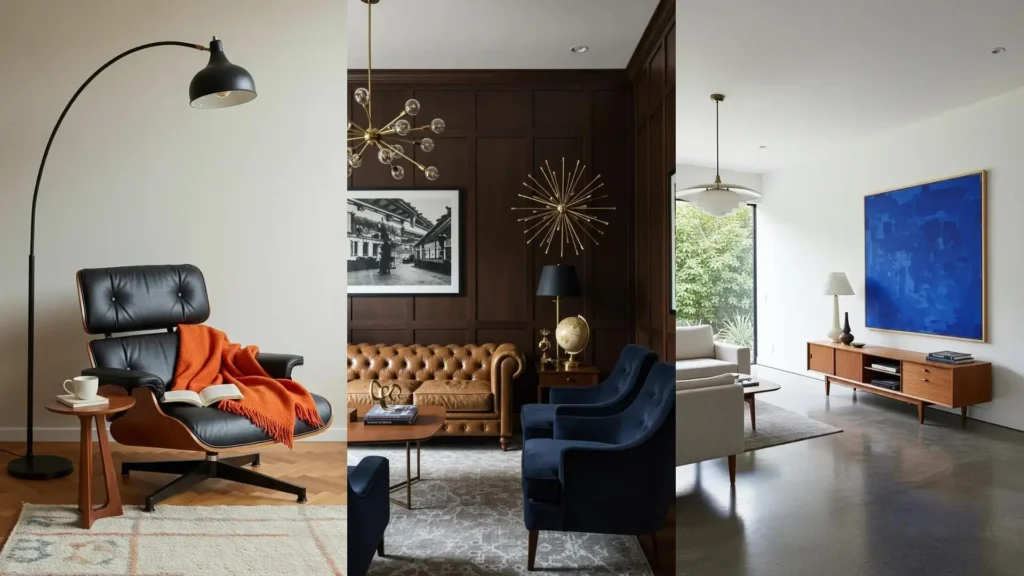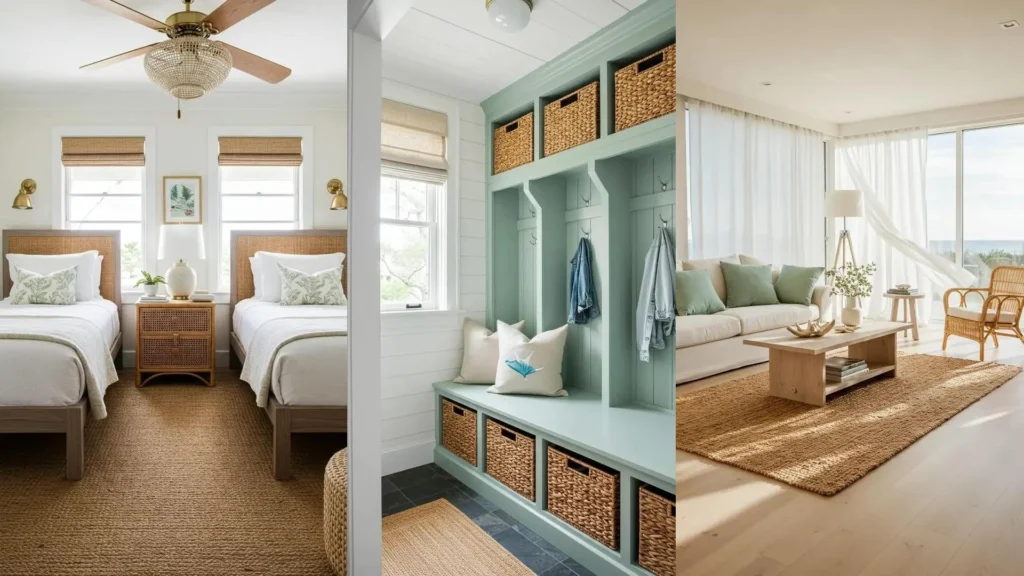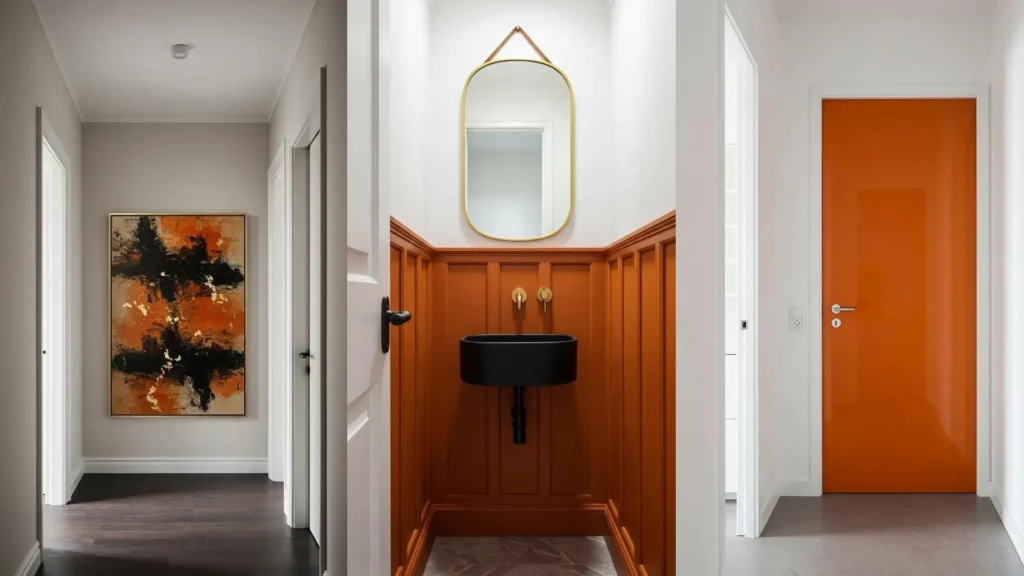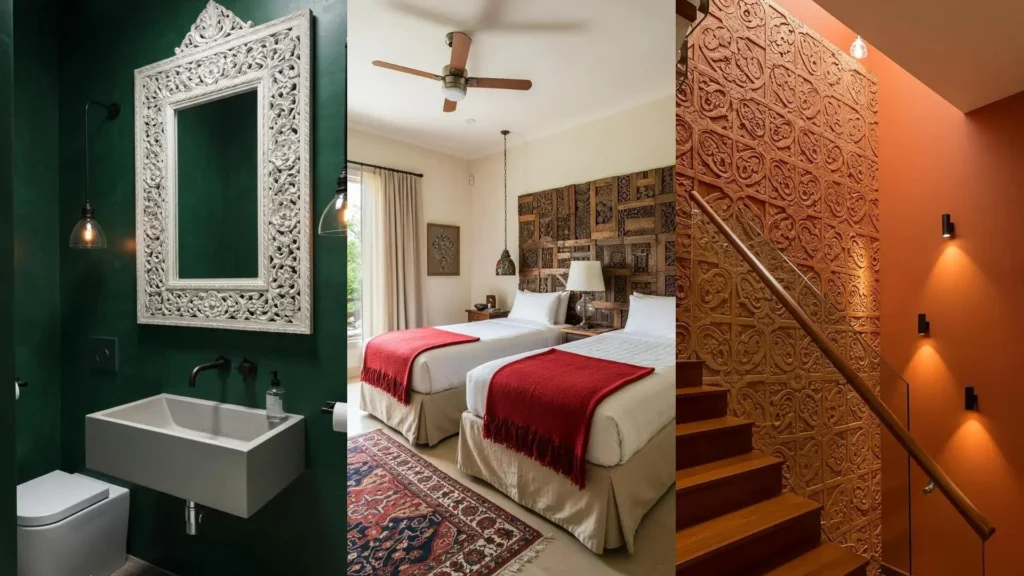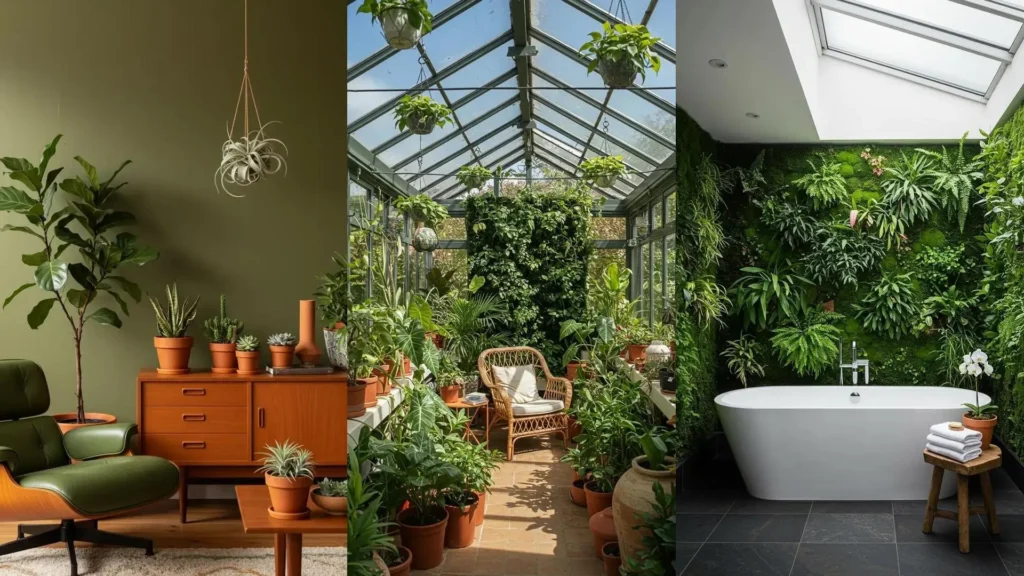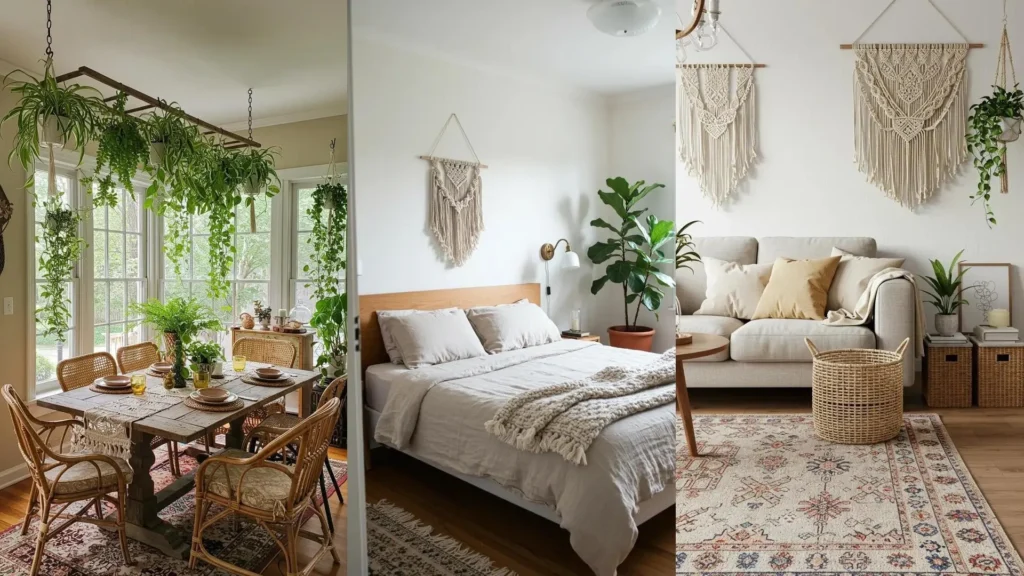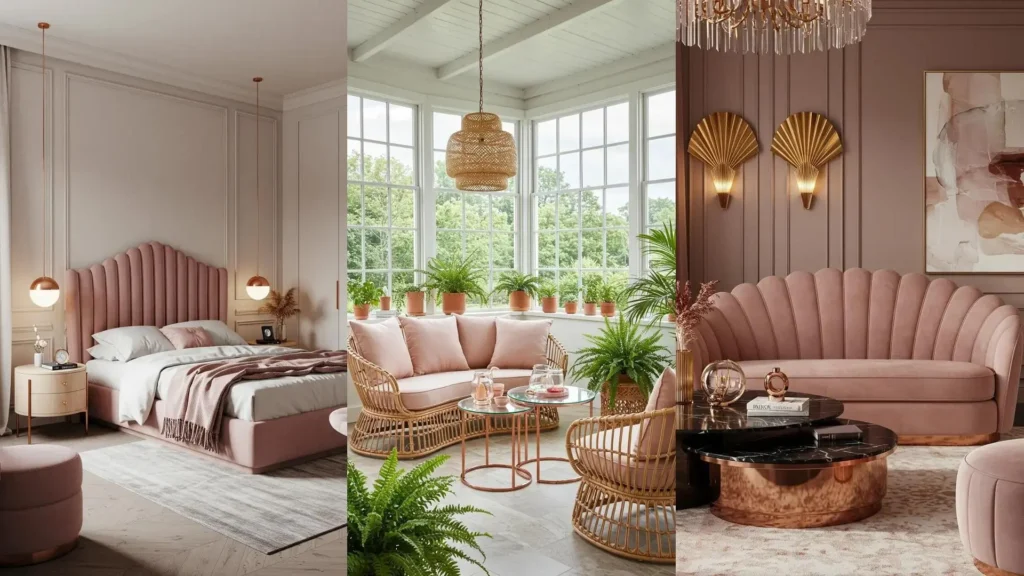The enduring appeal of Mid-Century Modern design lies in its beautiful honesty. The clean lines, the warmth of walnut, and the optimistic energy of its forms create spaces that feel both aspirational and deeply comfortable.
But the real art is in making it feel like your own—not a period-perfect museum. It’s about translating those core principles into a home that feels warm, personal, and relevant right now.
This is where we begin. Think of this not as a set of rules, but as a guide to help you see the possibilities in your own rooms. We will explore how to confidently mix walnut finishes, sculptural lighting, and energizing color to create a space that is cohesive, elegant, and unmistakably yours.
1. Layer Lighting for Dramatic Effect
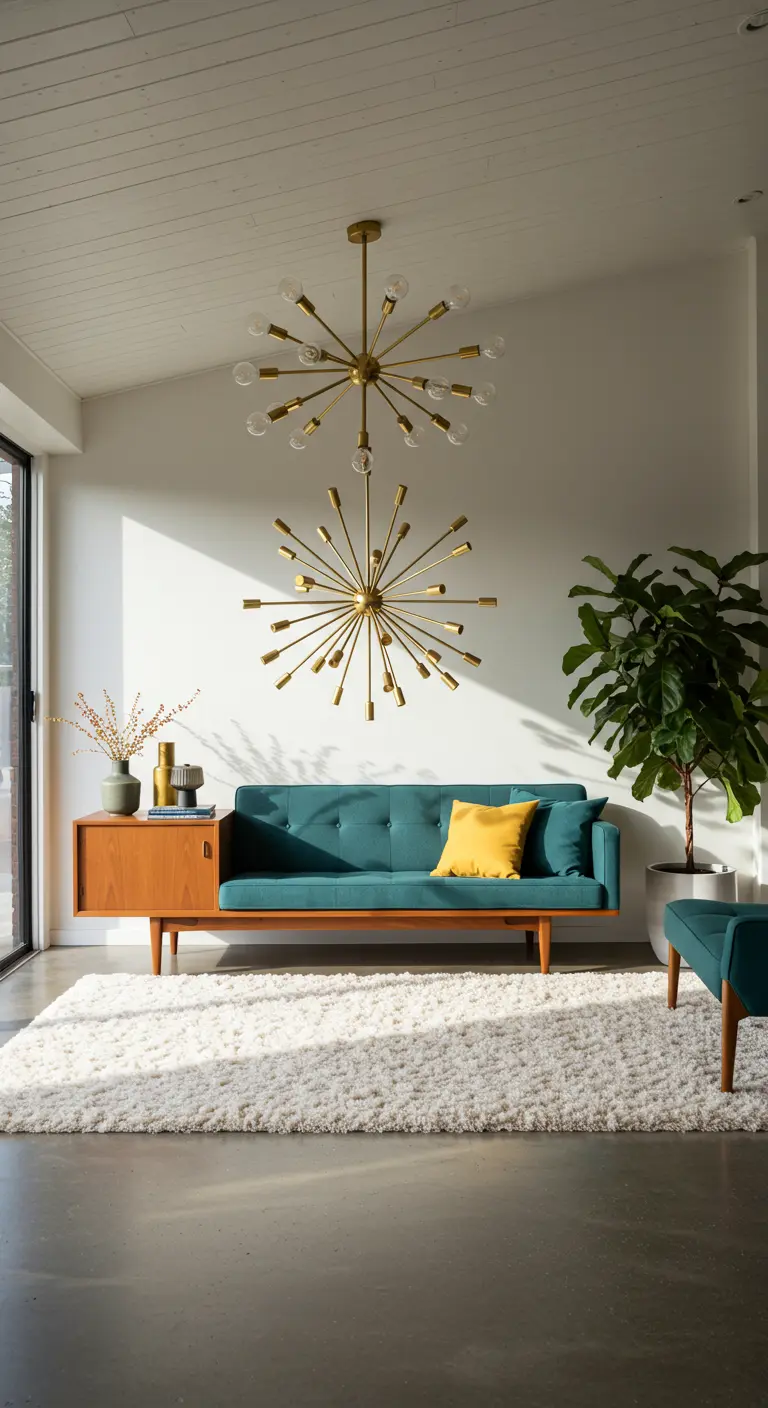
Instead of relying on a single overhead light, treat your lighting as sculpture.
Hang a primary chandelier, like a classic sputnik, in its traditional place, then mount a second one on a prominent wall.
This creates layers of light and visual interest, turning a functional element into a statement piece. It draws the eye around the room and adds an unexpected touch of artistry.
A rich walnut credenza grounds the airy brass and vibrant teal sofa, ensuring the room feels balanced. You can apply this layering principle in any room for more depth.
2. Embrace Dramatic Contrast with Dark Walls
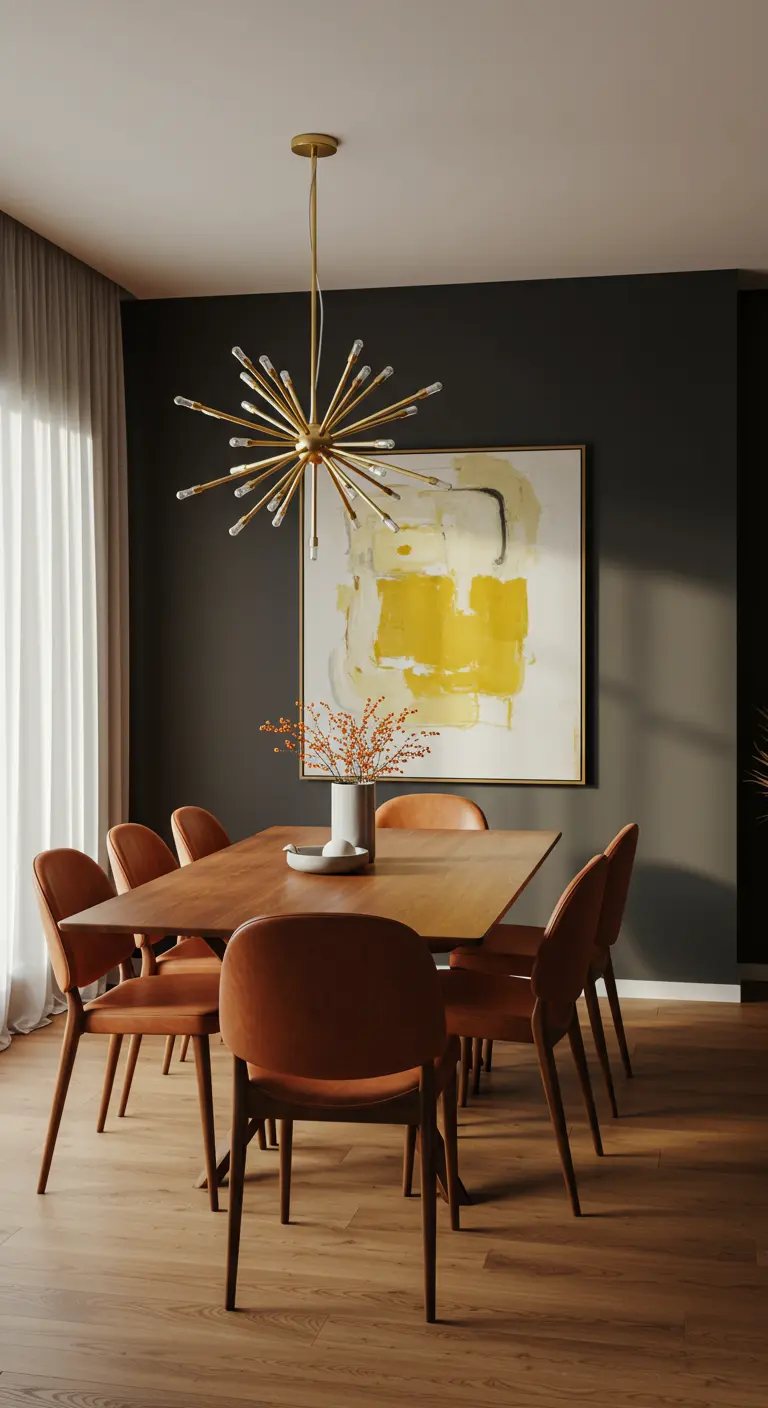
Do not be hesitant to use dark, moody paint colors, especially in a dining room.
A deep charcoal or navy wall makes warm walnut and brass finishes feel richer and more luxurious by contrast.
To keep the space from feeling too heavy, hang a large piece of bright, abstract art. This creates a powerful focal point and balances the room’s atmosphere, adding personality and light.
3. Commit to a Cohesive Wall Color
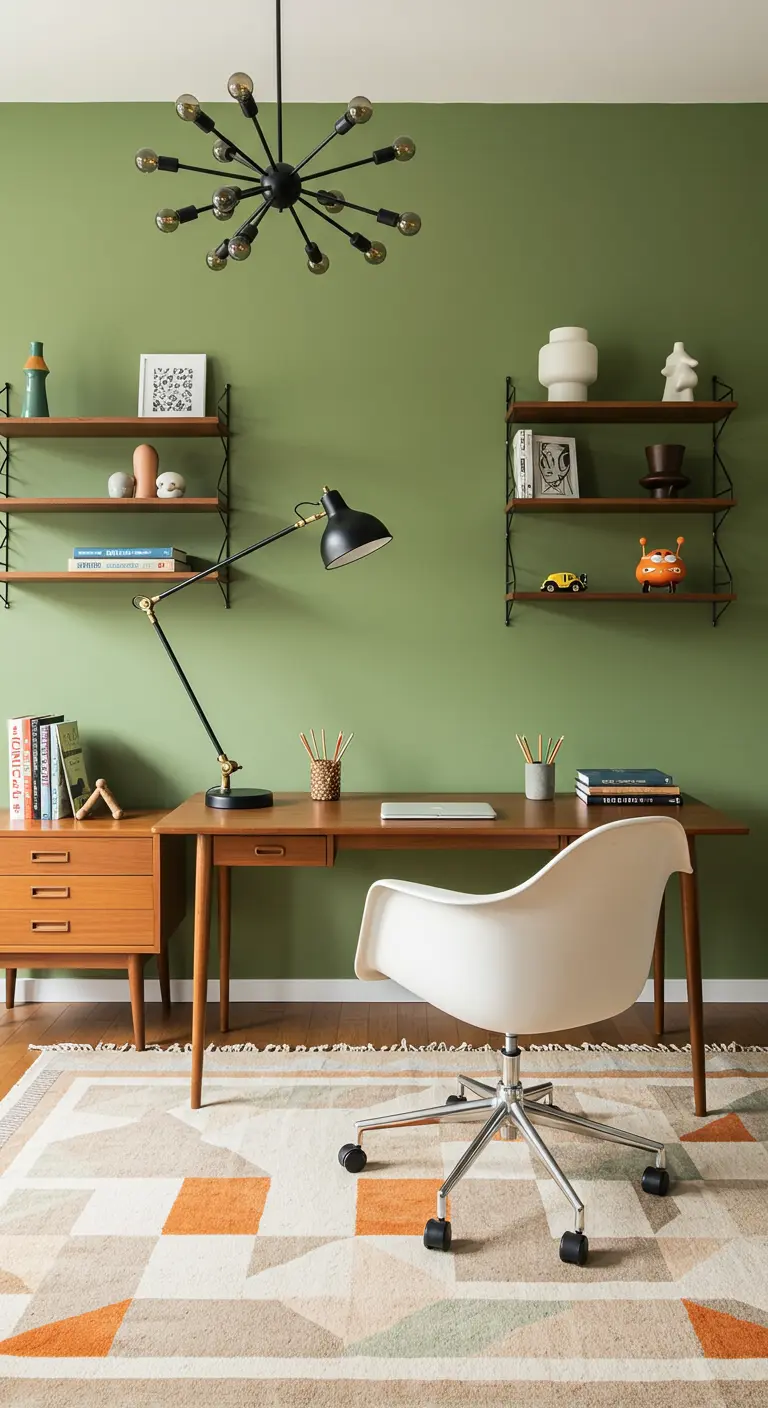
In a home office, a single, saturated color like this olive green creates an immersive and focused environment.
By painting all walls the same shade, you eliminate visual distractions and allow the furniture and decor to stand out.
To prevent the color from overwhelming the space, choose open, airy shelving. This displays your objects without adding visual bulk, while the warm walnut desk provides a natural, grounding element.
4. Cultivate Serenity with a Matched Set
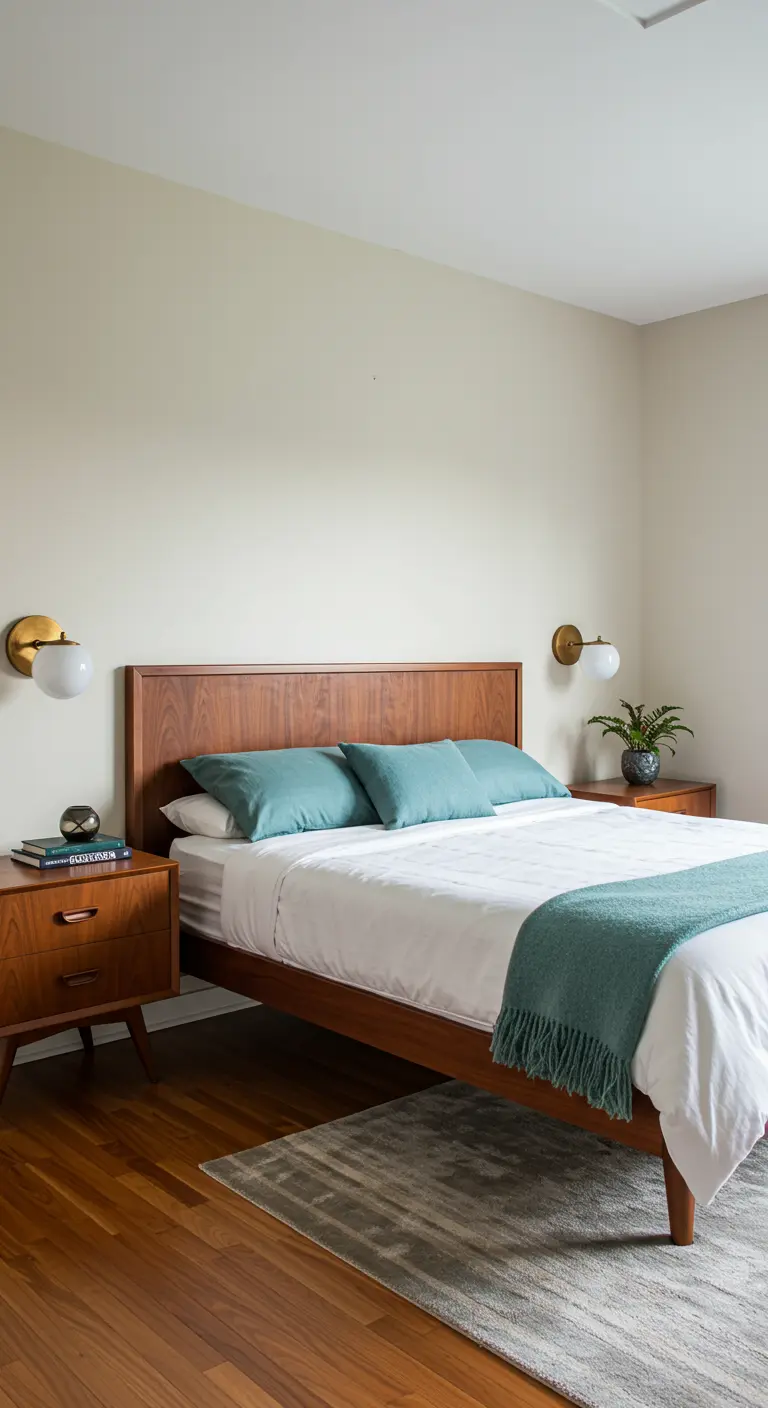
For a bedroom that feels instantly calm and pulled-together, invest in a matching bed frame and nightstands.
The consistent walnut finish creates a unified, restful foundation. This allows you to introduce color and texture through textiles—like pillows and throws—which are simple to change with the seasons or your mood.
Opt for simple, wall-mounted globe sconces to free up nightstand space and provide soft, diffused light ideal for winding down.
This is a foundational approach for many romantic bedroom schemes.
5. Define Zones in an Open-Concept Space
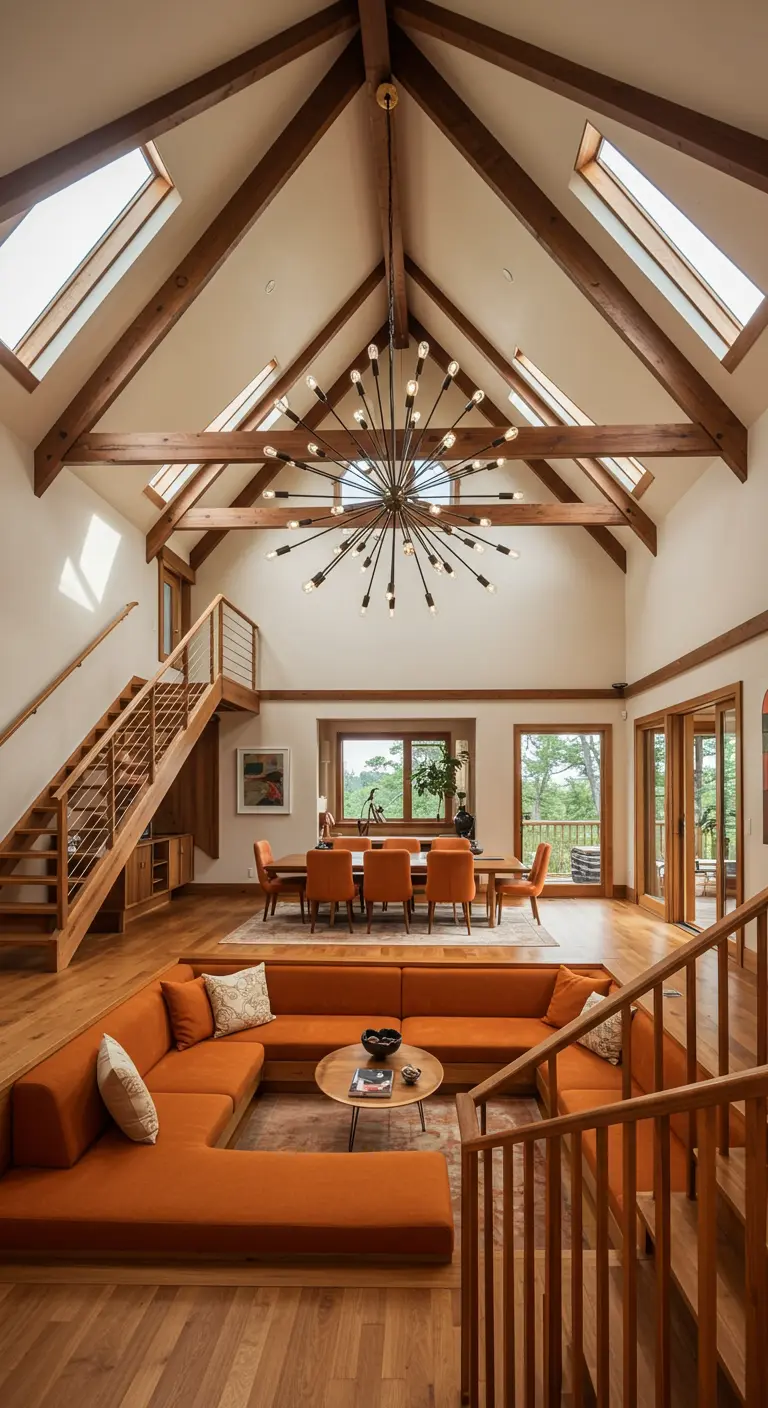
In a large room with high ceilings, you must create definition to avoid it feeling cavernous.
Use architectural changes in level, like this sunken conversation pit, to establish distinct zones for different activities.
The change in elevation clearly separates the lounge area from the dining space above it, creating intimacy within an open floor plan. A single, oversized chandelier then serves as a unifying element that ties the entire room together.
6. Make a Deliberate First Impression
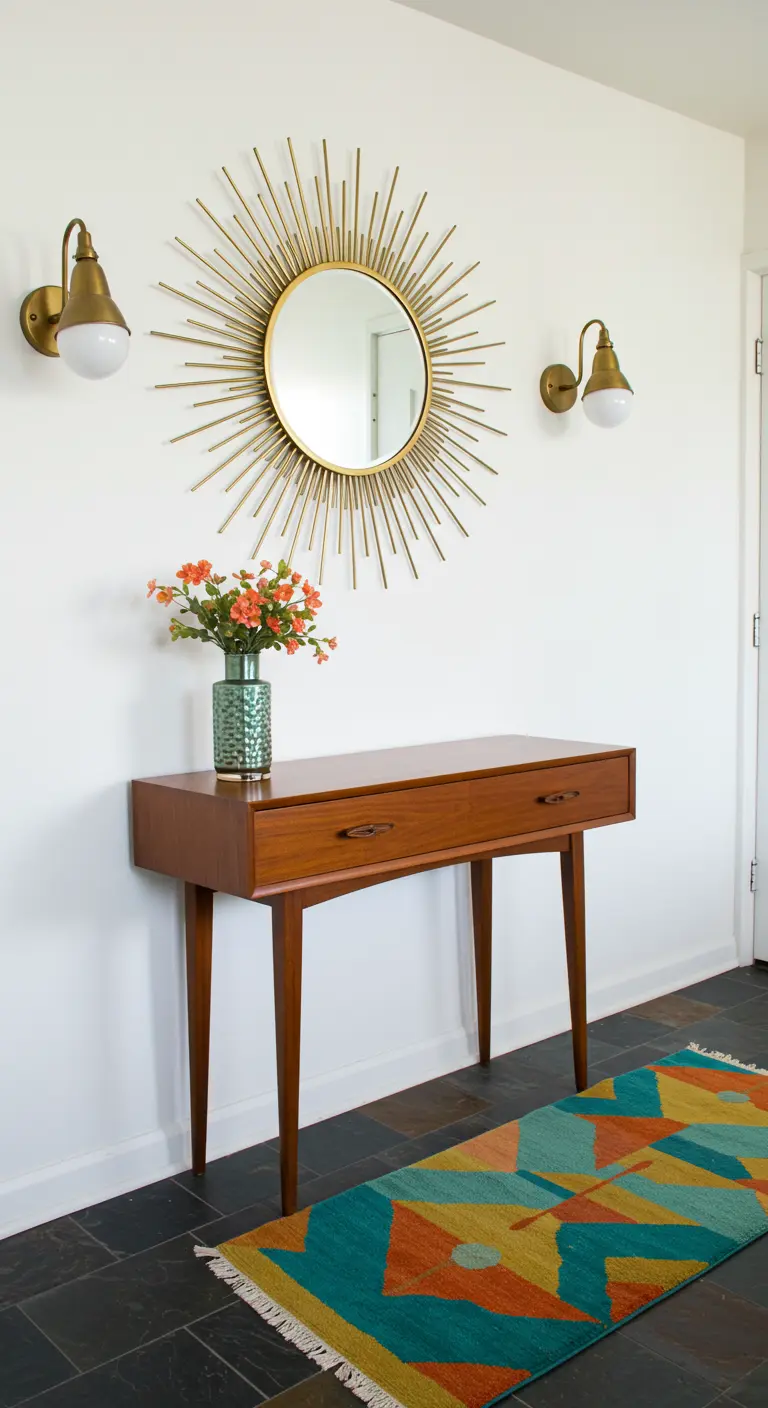
Your entryway sets the tone for your entire home, but it doesn’t require a lot of furniture to feel complete.
Choose a slim, leggy console table in a warm walnut to provide a functional landing spot without consuming floor space.
Above it, a sunburst mirror does more than just fill a wall; it acts as a piece of sculpture and reflects light, making the entry feel brighter and more expansive.
A colorful, geometric runner introduces personality the moment you walk in. These are clever ways to decorate a tiny entryway that work every time.
7. Balance Rich Wood with Lightness
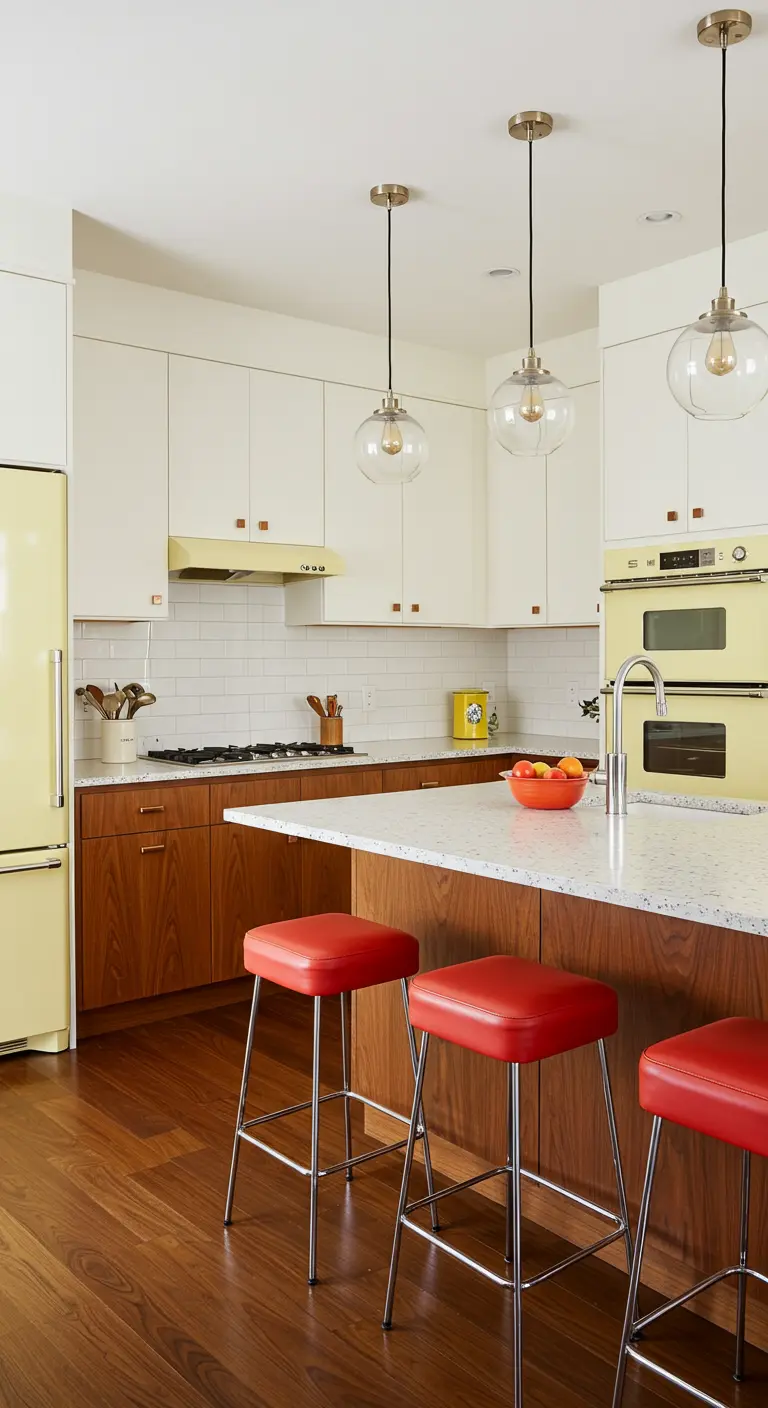
A kitchen with all-wood cabinetry can sometimes feel heavy or dated. The solution is to create contrast.
Pair rich walnut base cabinets with crisp, white upper cabinets. This simple switch draws the eye upward, making the ceiling feel higher and the entire space feel brighter and more open.
This two-tone approach allows you to enjoy the warmth of wood while maintaining a fresh, modern aesthetic. The playful, retro-hued appliances and stools add a final layer of personality.
8. Carve Out a Dedicated Reading Corner
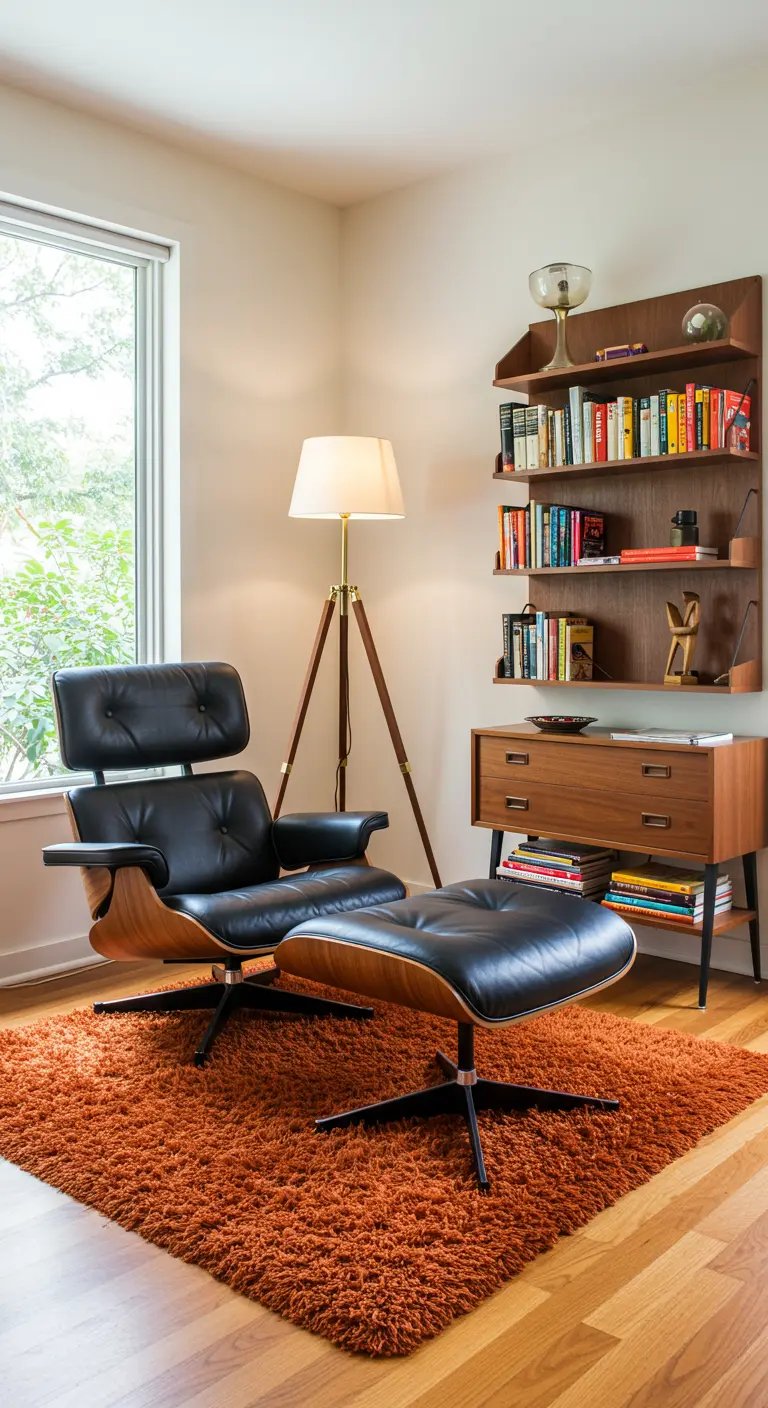
You don’t need an entire room to create a space for retreat. Claim a corner and furnish it with intention.
An iconic lounge chair and ottoman immediately signal that this spot is for comfort and relaxation.
Ground the area with a high-pile shag rug for textural warmth, and ensure you have dedicated task lighting from a handsome floor lamp.
Using wall-mounted shelving frees up precious floor space, making the corner feel purposeful but not cluttered. Many cozy corners can be created with this simple formula.
9. Maximize Awkward Corners with a Banquette
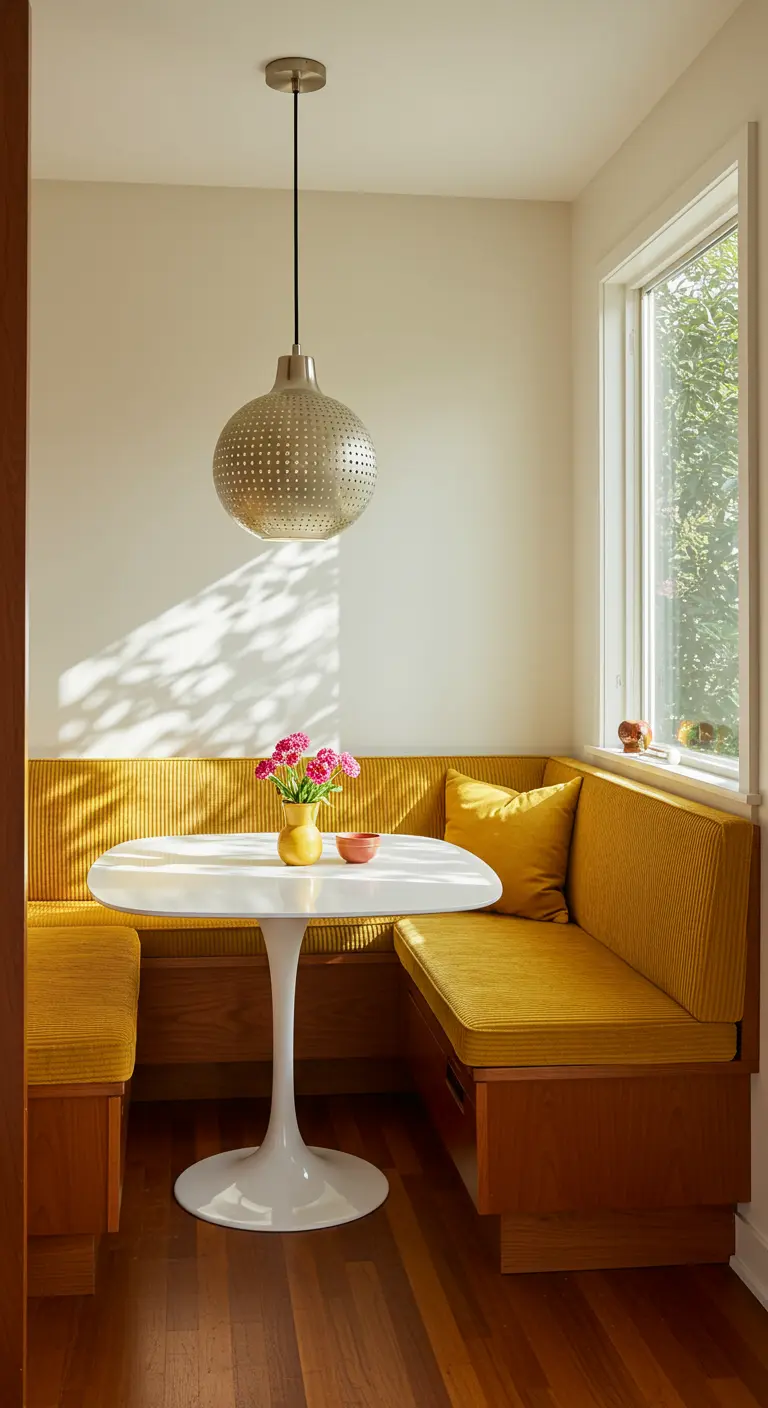
A custom built-in banquette is the single most effective way to transform an underutilized corner into a functional and charming dining nook.
It provides more seating than chairs would in the same footprint. Upholster it in a durable, textured fabric like corduroy or velvet for comfort and a touch of retro style.
Pair it with a pedestal table, like this tulip design, which eliminates legs and maximizes room for getting in and out easily.
10. Add Architectural Texture with a Slat Wall
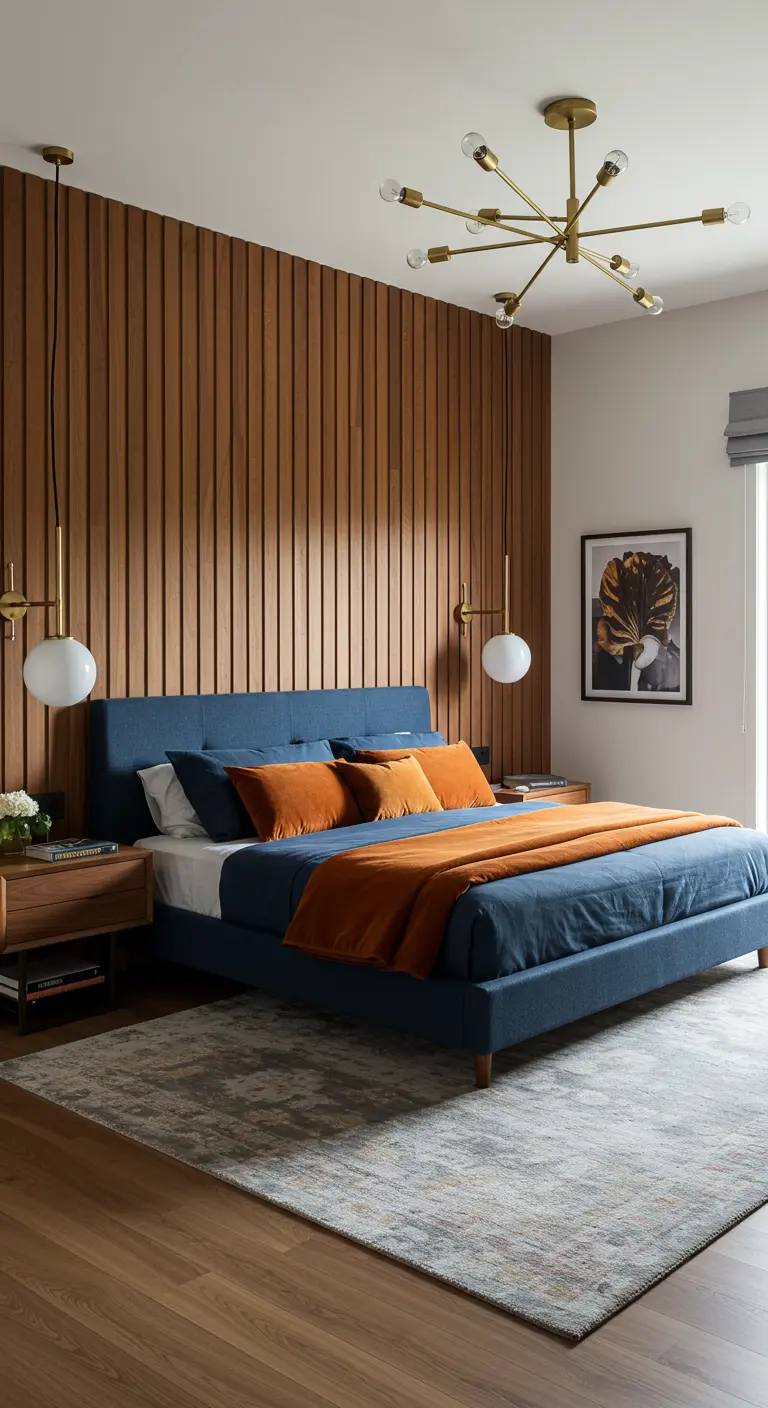
An accent wall doesn’t have to be paint. A floor-to-ceiling installation of vertical wood slats adds immense warmth, texture, and architectural interest.
It functions as a grand, integrated headboard, making the bed the clear focal point of the room.
To soften the strong lines of the wood, choose a bed frame upholstered in a contrasting color, like this deep blue. The play between the hard wood and the soft fabric creates a sophisticated, balanced look.
11. Introduce Softness with Sculptural Curves
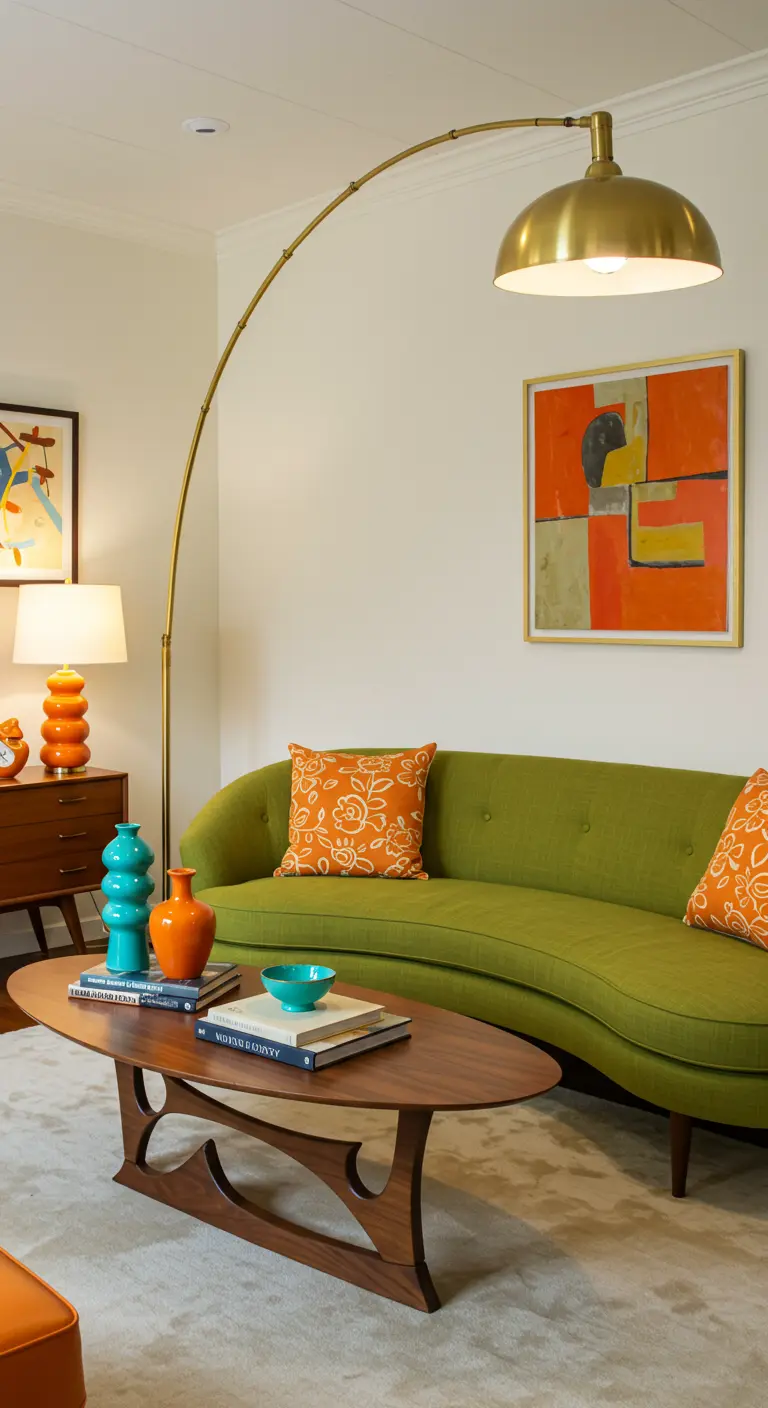
Mid-century modern design often features clean, straight lines. To prevent a room from feeling too rigid, you must intentionally introduce curves.
A kidney-shaped sofa or a coffee table with organic lines, like this Noguchi-inspired piece, immediately softens the space and improves the visual flow.
An arc floor lamp is a brilliant solution for providing overhead light without the need for ceiling wiring, and its graceful curve reinforces the room’s softer geometry.
12. Allow a Single Piece of Art to Command the Room
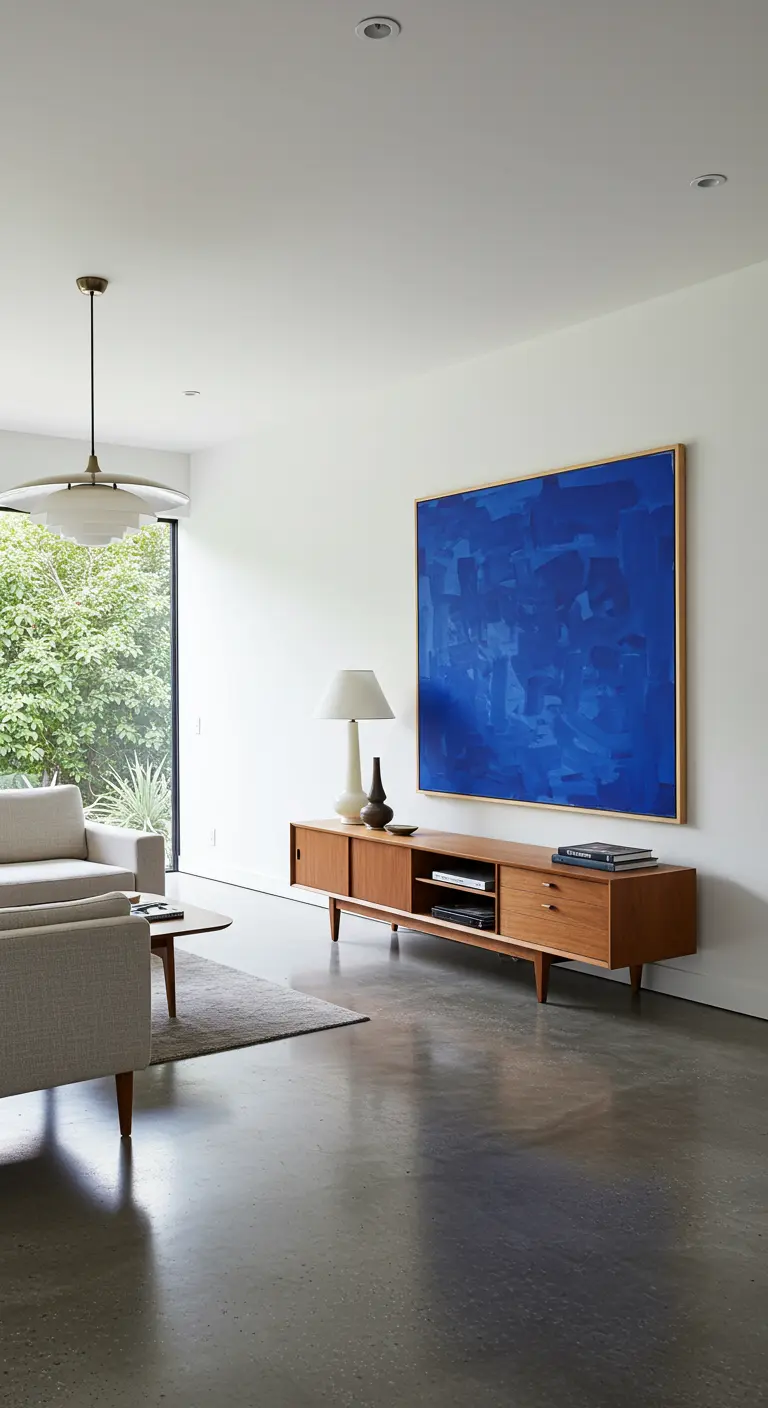
When you have a piece of artwork that you truly love, give it the space to be the main event.
Choose a long, low-profile credenza that sits well below the art. This grounds the composition without competing for attention.
Keep the surrounding furniture and lighting simple and neutral. By minimizing other distractions, you allow the scale and color of the artwork to have its full impact.
You see this principle applied in many eclectic home designs.
13. Unify a Room with Repetitive Color
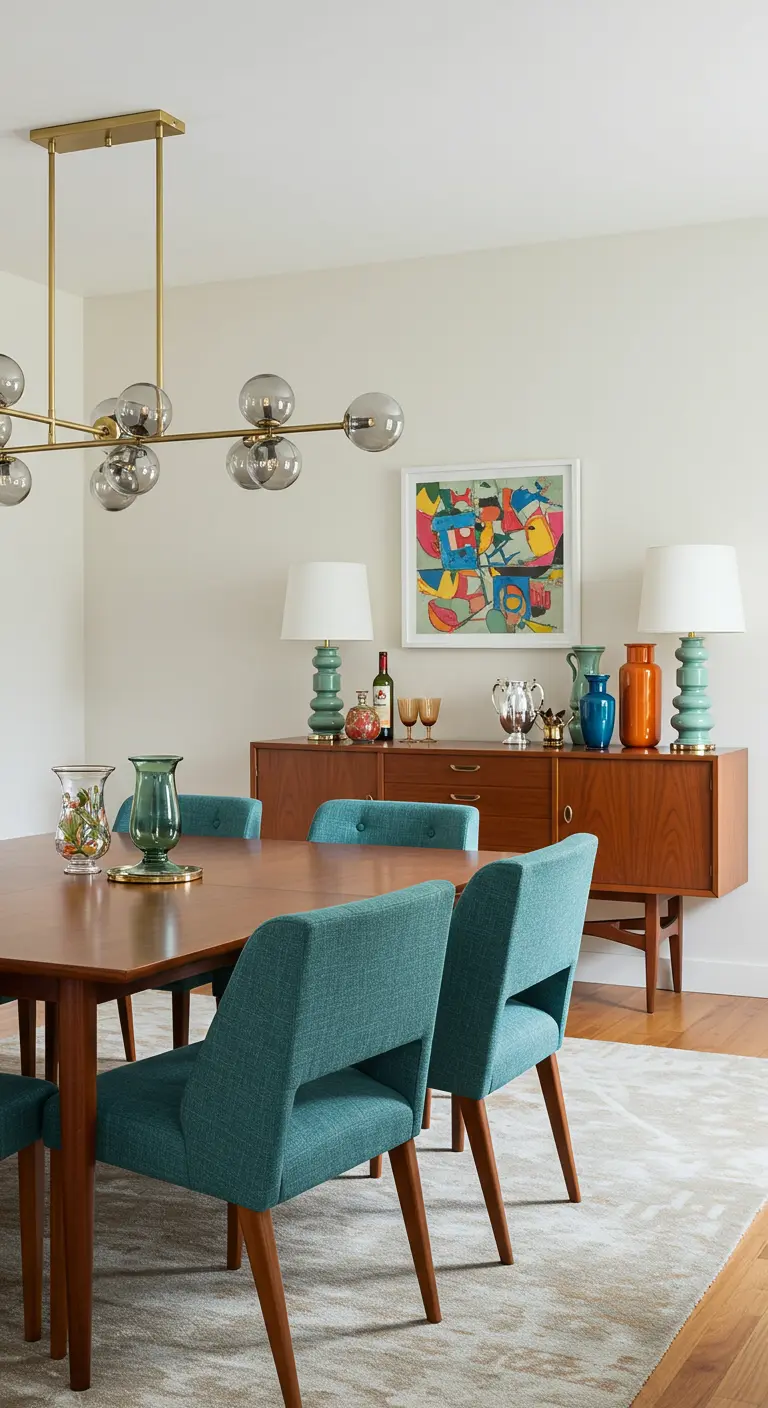
A cohesive room is not about matching everything perfectly, but about creating harmony through repetition.
In this dining room, the vibrant teal of the chairs is subtly echoed in the ceramic lamp bases on the sideboard. The warm walnut of the dining table is mirrored in the credenza.
These repeated elements create a visual rhythm that makes the space feel intentional and complete, while the brass chandelier adds a touch of unifying warmth.
14. Blur the Line Between Indoors and Out
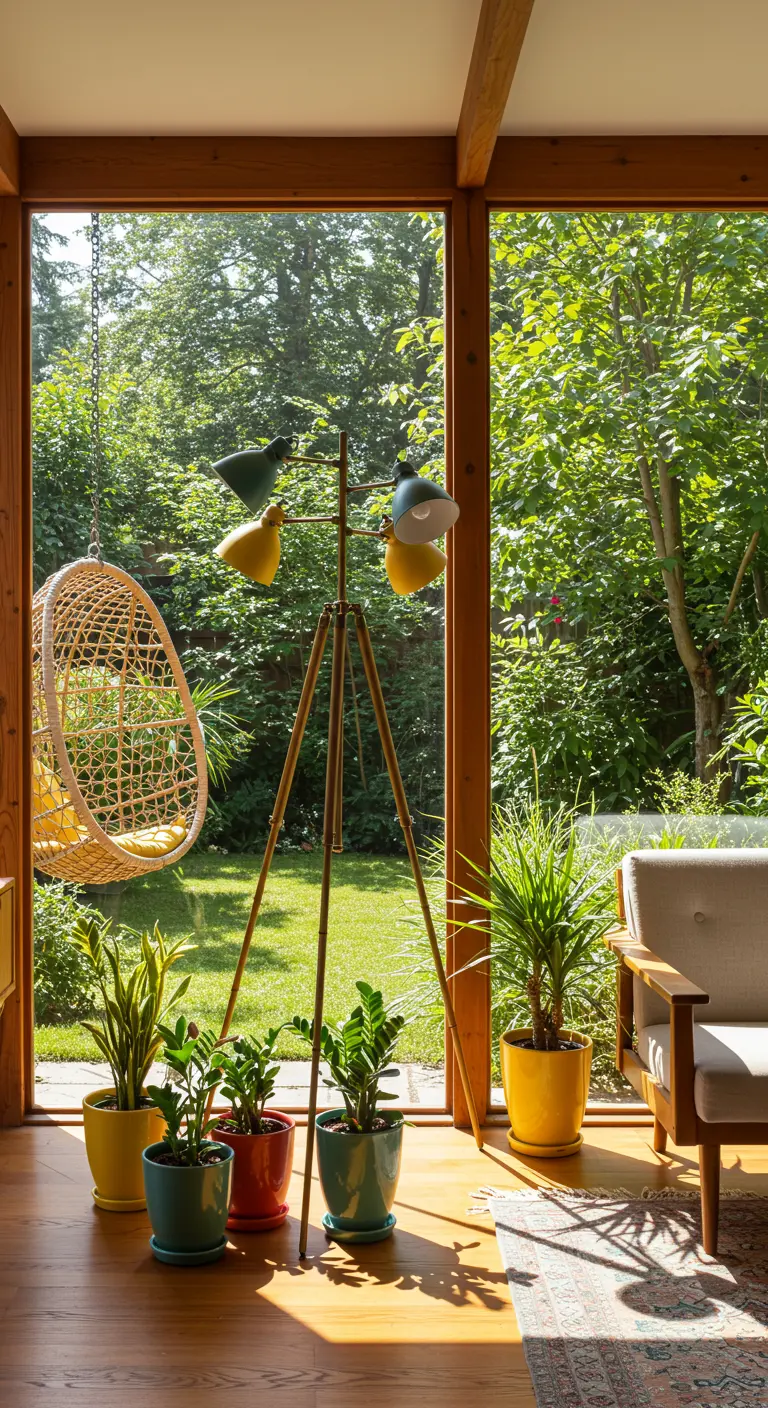
If you are lucky enough to have a room with expansive windows, use your interior decor to connect with the view.
Embrace natural materials like the wicker of the hanging chair and the wood frames of the furniture.
Most importantly, incorporate an abundance of plants. Grouping them in colorful pots turns them into a decorative feature, effectively bringing the garden inside and creating a seamless transition.
This creates one of those beautiful nature-inspired small spaces that feels alive.
15. Create a Moody, Sophisticated Retreat
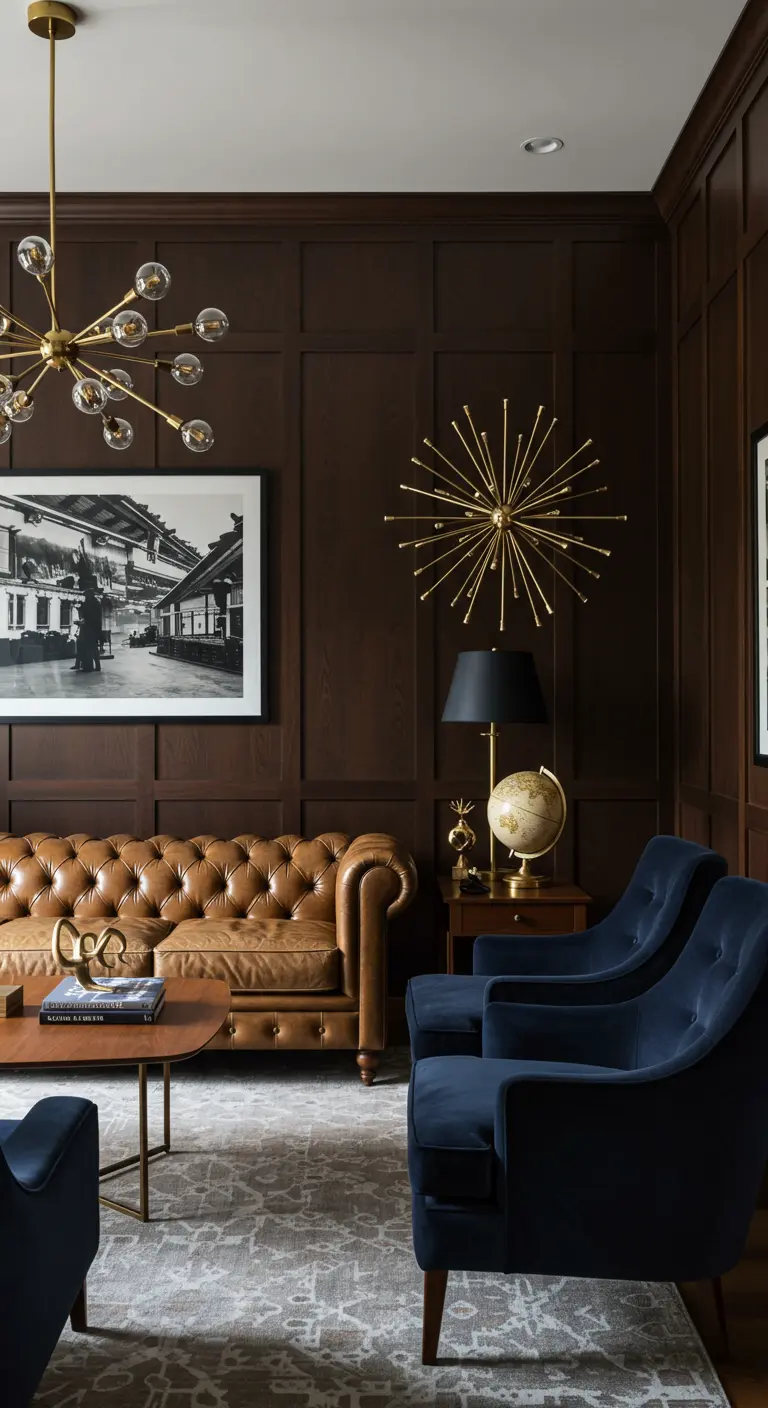
For a den or library, lean into a darker, richer palette to create an intimate, club-like atmosphere.
Dark wood paneling provides a classic, enveloping warmth. The key to making it modern is the mix of textures: the timeless appeal of a tufted leather sofa plays against the clean lines and luxe feel of navy velvet armchairs.
Finally, brass accents—from the sputnik wall sculpture to the lamp—add a layer of metallic brightness that keeps the room from feeling too dark.
16. Designate a Polished Space for Entertaining
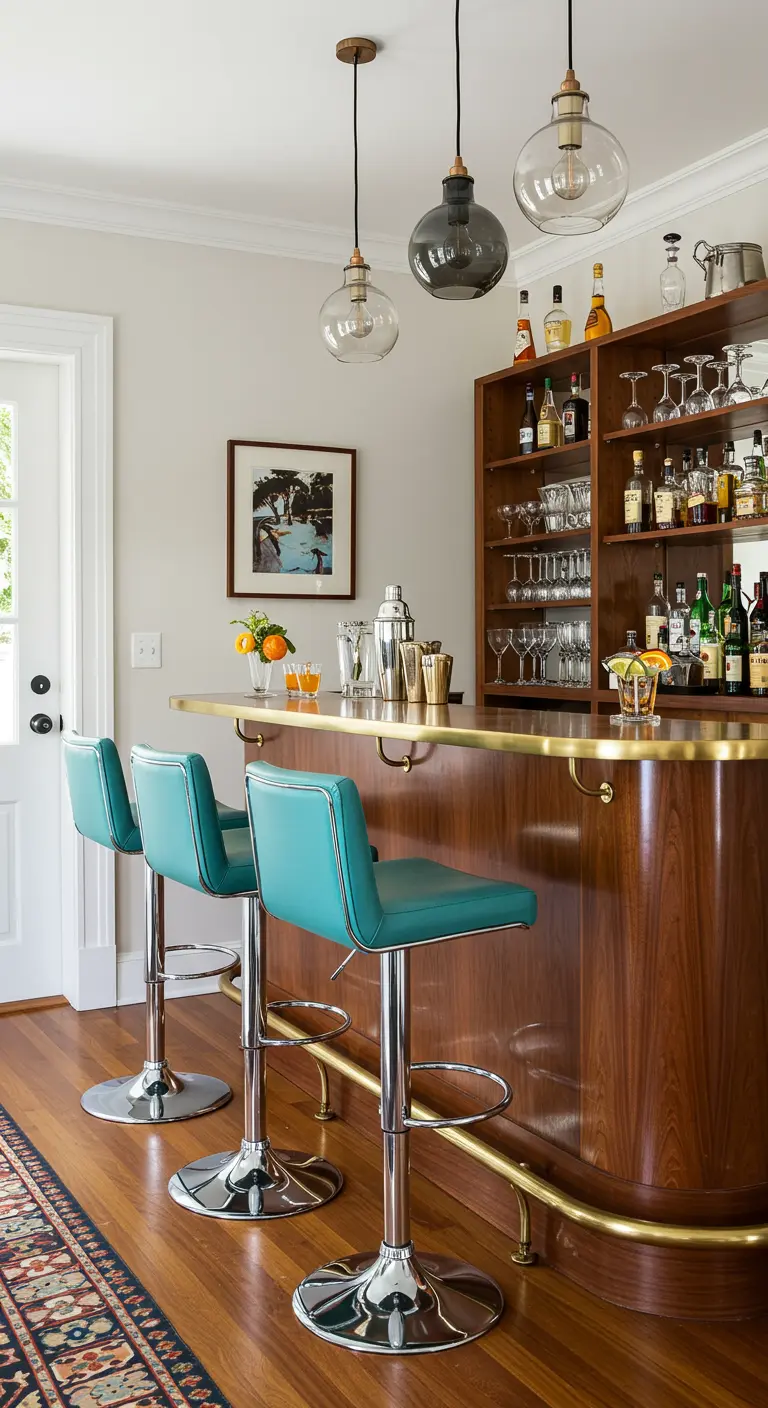
A dedicated home bar, no matter its size, elevates the act of entertaining.
A curved counter is inherently more social and inviting than a straight one, encouraging guests to gather around.
Invest in comfortable, stylish bar stools with a pop of color, and hang a series of pendant lights low over the bar. This creates a pool of intimate light, defining the area and setting a convivial mood.
17. Commit Fully to a Retro Pattern
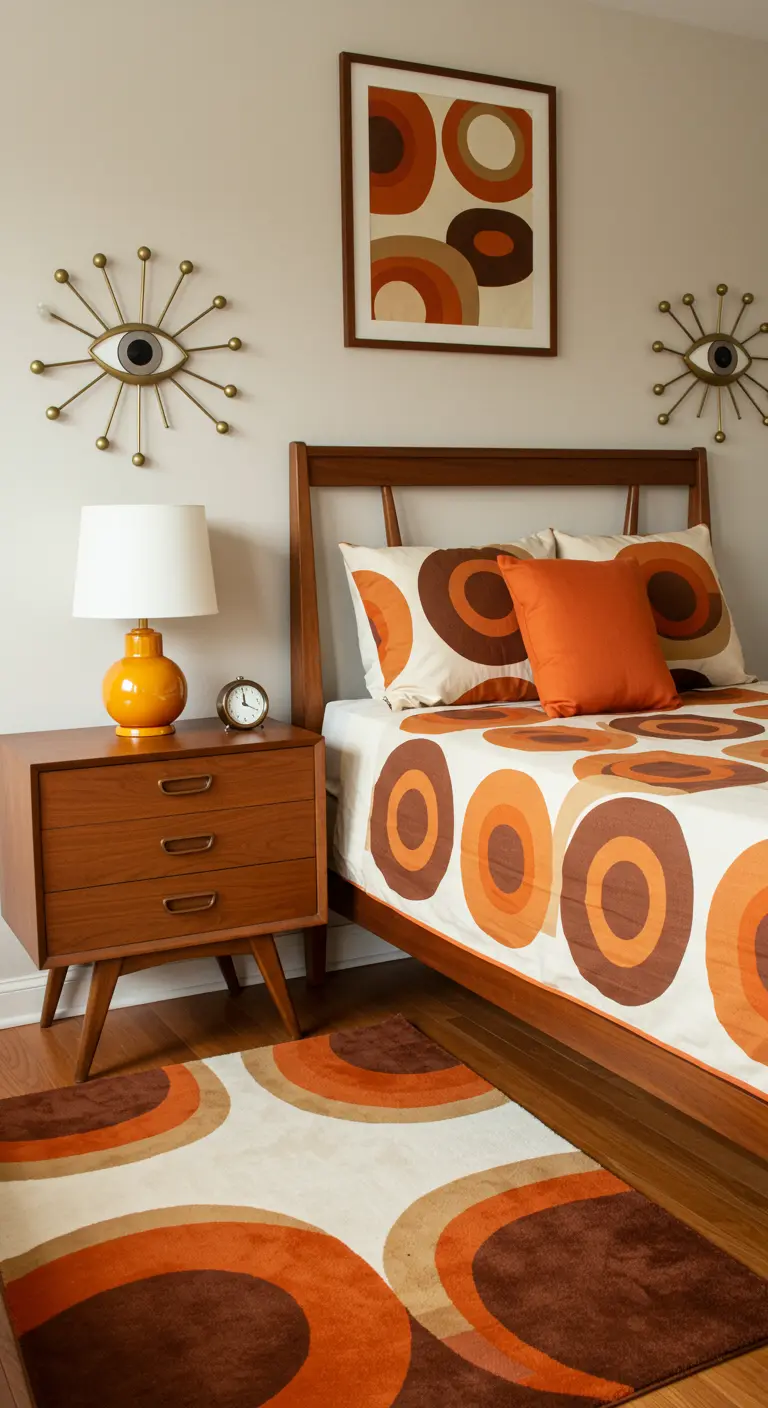
If you’re drawn to the bolder side of mid-century design, don’t be timid. The key to making a strong pattern work is to commit to it.
Using the same vibrant, graphic print on both the bedding and the area rug creates a powerful, intentional statement.
To keep the look feeling chic rather than chaotic, ground it with simple, classic furniture. The clean lines of the walnut bed frame and nightstand provide a calm foundation that lets the pattern shine.
18. Turn a Hallway into a Design Destination
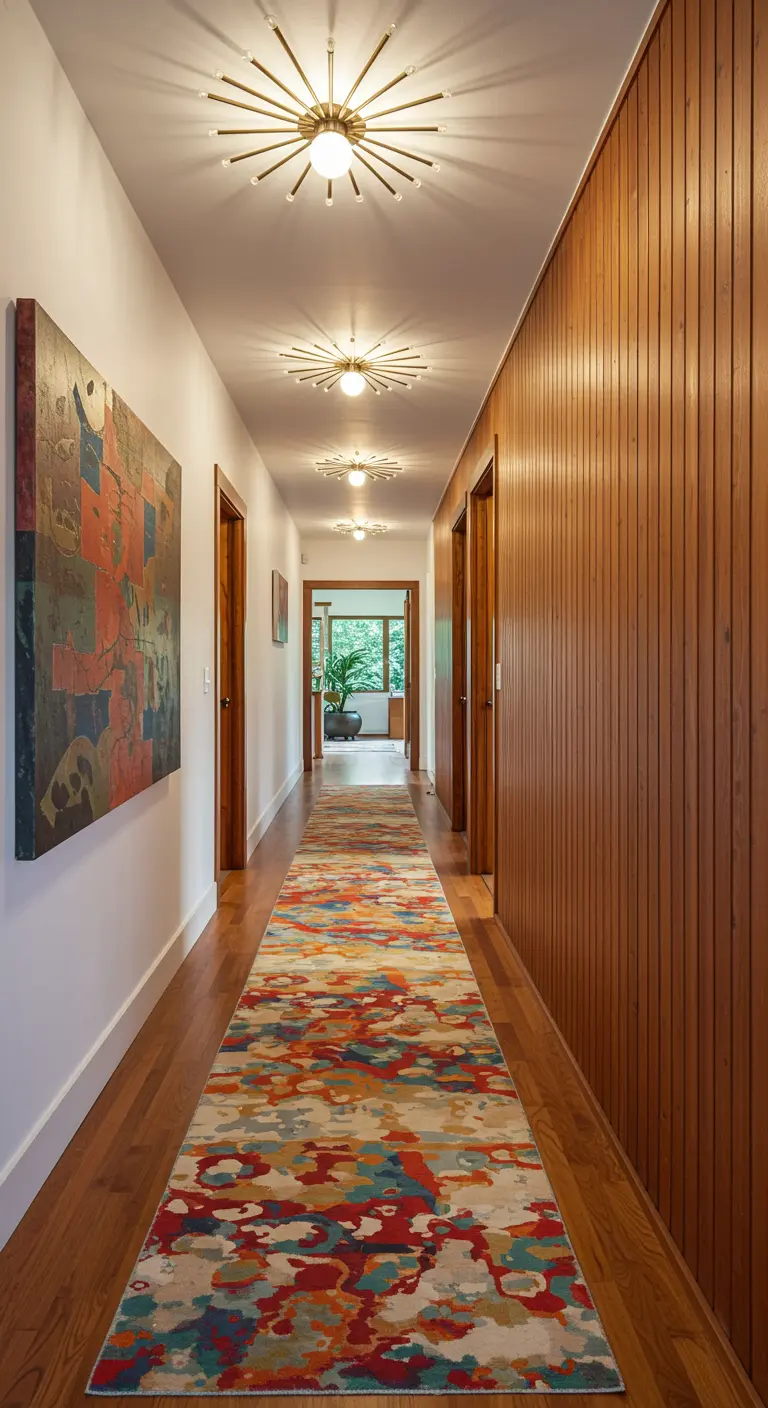
A hallway should never be an afterthought; it’s a critical connective space in your home.
Treat it with the same design intention as any other room. A continuous wall of vertical wood paneling creates a strong directional line, drawing you through the space and adding immense texture.
A vibrant, patterned runner introduces color and softness, while a series of stylish sputnik flush-mounts ensures the entire length is beautifully and evenly lit.
19. Achieve Balance with Hard and Soft Textures
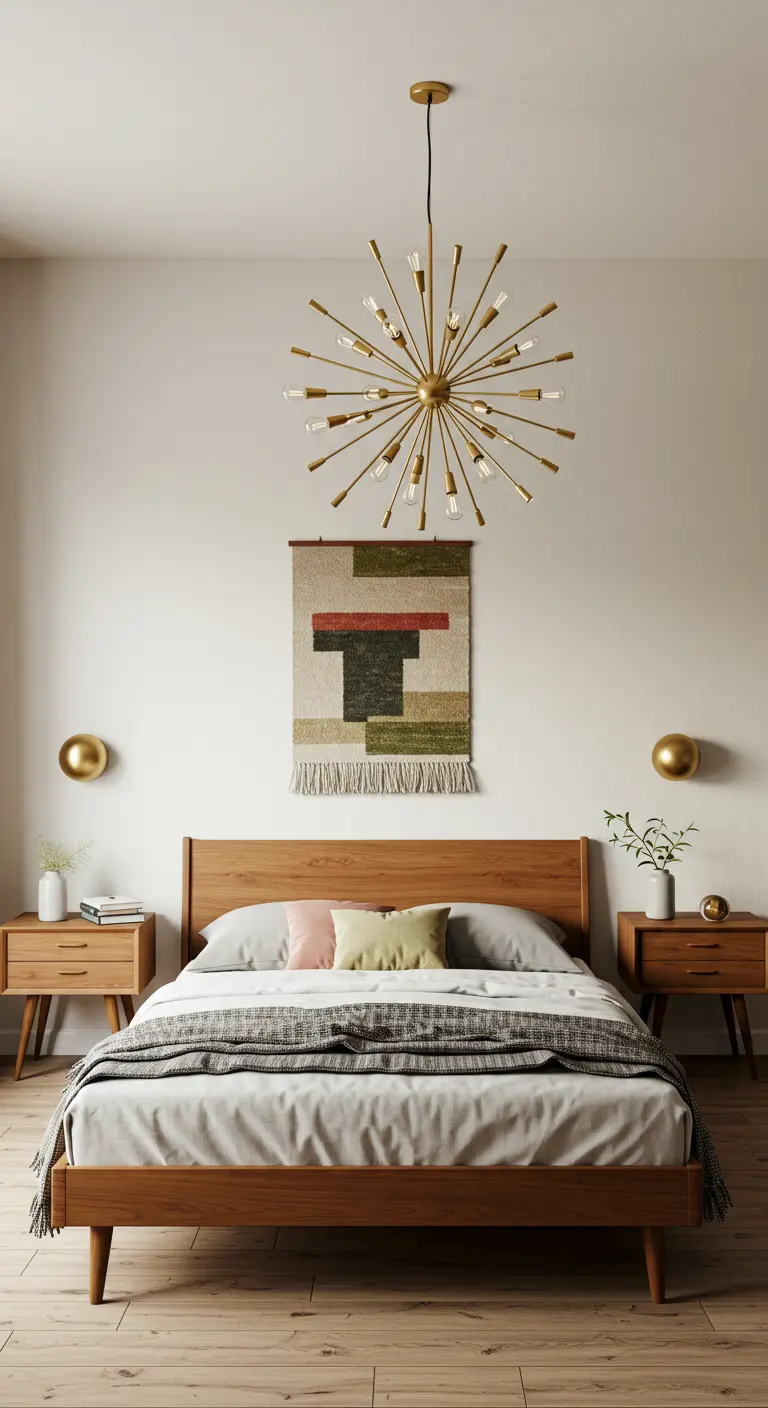
A truly inviting room is a study in contrasts. Here, the sharp, metallic geometry of the sputnik chandelier provides a striking counterpoint to the soft, organic texture of the woven wall hanging.
One is hard and graphic; the other is soft and handmade. Placing them in close proximity creates a dynamic visual tension.
The simple walnut bed and neutral bedding act as a calm, warm foundation that allows both statement pieces to coexist beautifully. It’s a core principle in many Japandi interior ideas.
20. Add Instant Comfort with a Simple Throw
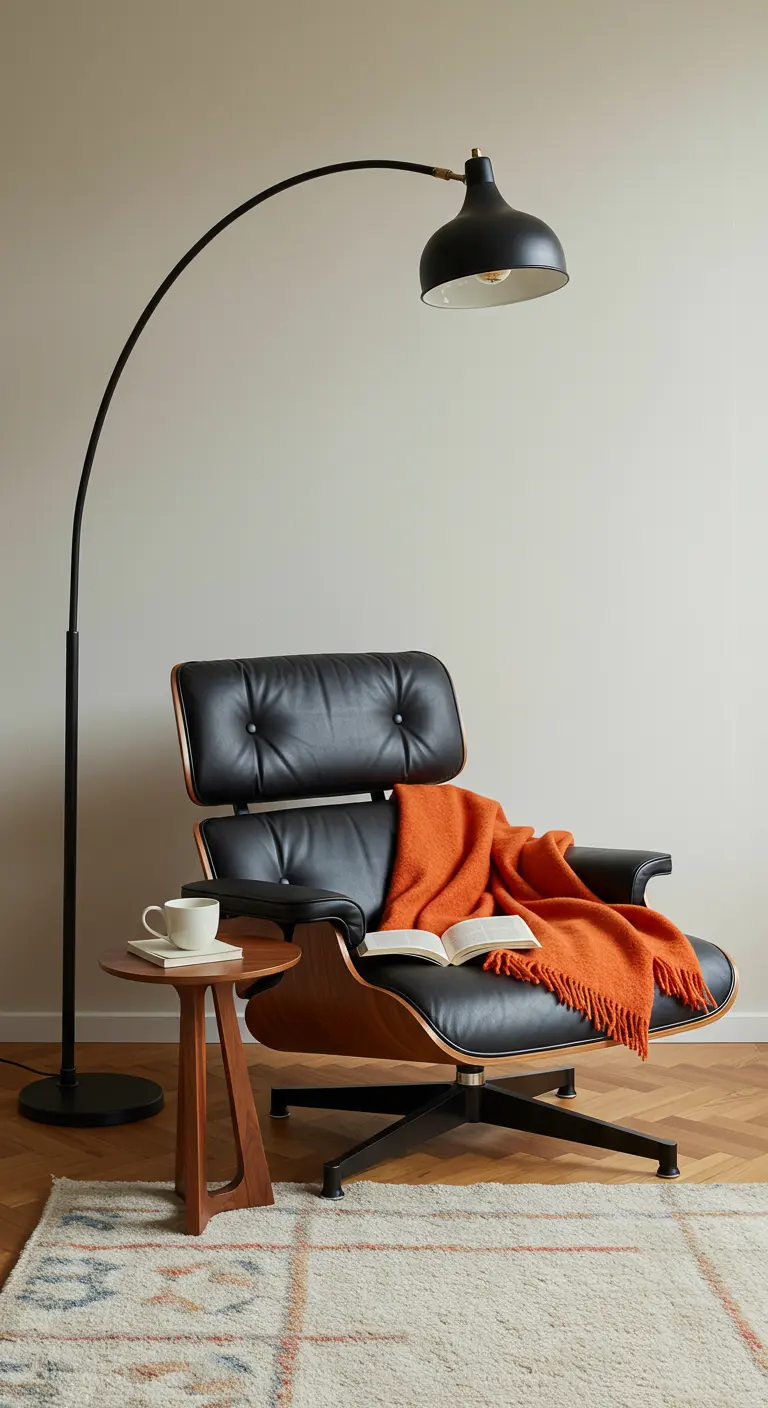
Even the most iconic piece of furniture benefits from a human touch. A sculptural lounge chair, while beautiful, can feel austere on its own.
The simplest way to make it more inviting is to add a textile. A soft, richly colored throw blanket instantly introduces warmth, texture, and a welcoming feel.
It’s a low-cost, high-impact gesture that makes a design-forward piece feel like a comfortable part of your home.
21. Use Built-Ins for Seamless Cohesion
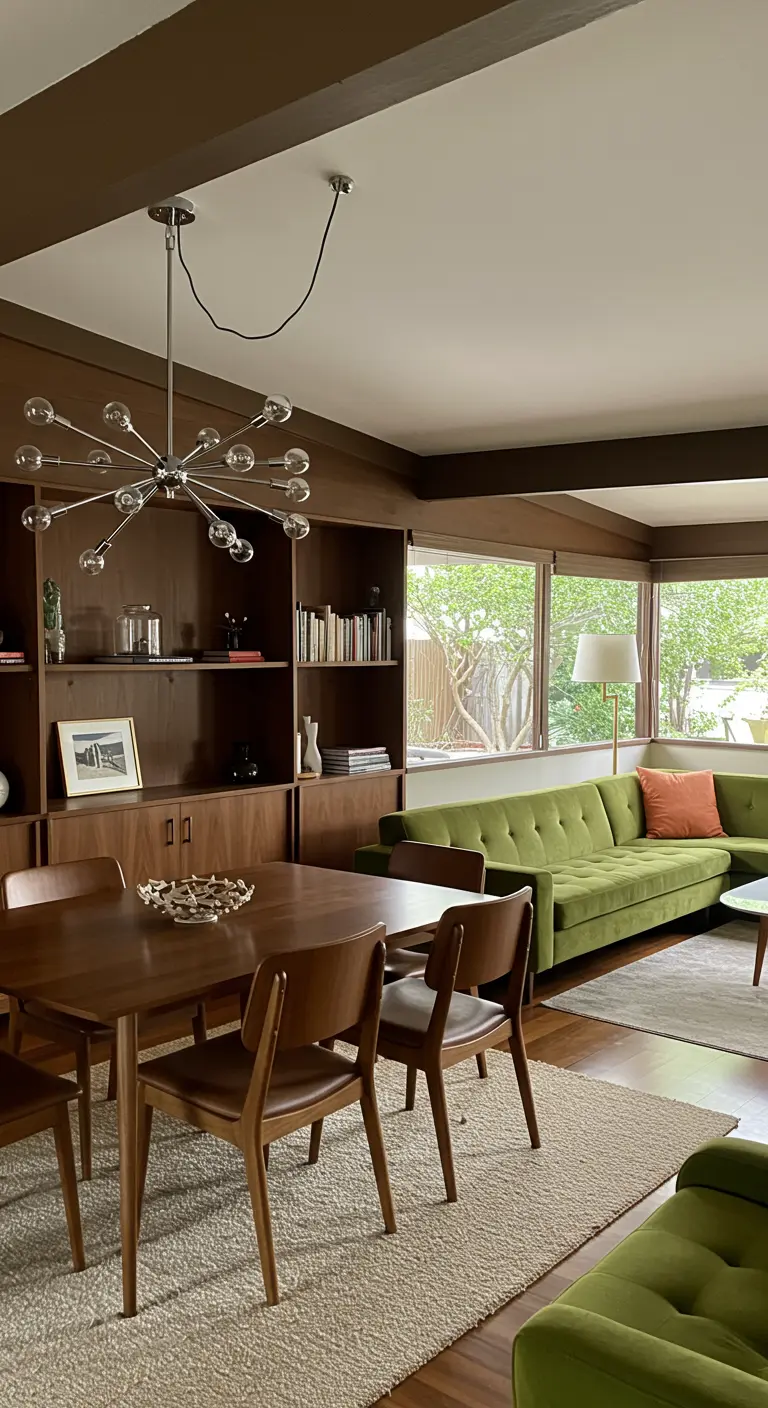
In an open-concept layout, a wall-to-wall built-in is your most powerful tool for creating a cohesive look.
Constructed from the same warm walnut as the dining set, this unit visually links the living and dining zones, making them feel like a single, intentionally designed space.
It offers invaluable storage and display space while reinforcing the home’s architectural style. The continuity it provides is both elegant and practical.
22. Capitalize on Vertical Space
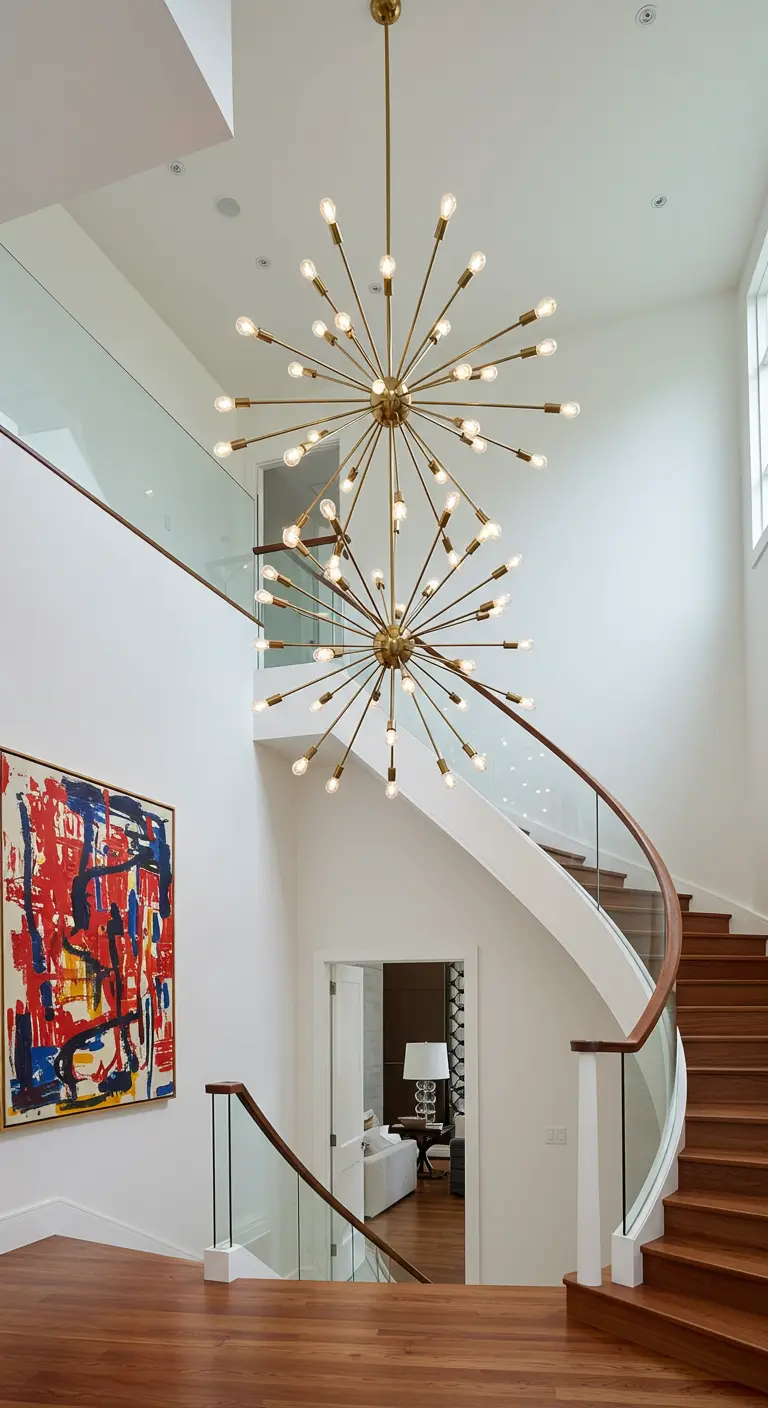
A tall stairwell offers a unique opportunity for a grand design gesture. Don’t let that vertical space go to waste.
Hanging two large, tiered chandeliers at different heights creates a spectacular cascading effect that fills the volume of the space.
It’s a lighting installation that feels like a custom piece of art. To ensure the fixtures remain the star, opt for a modern glass railing that keeps the view completely unobstructed.
23. Integrate Your Hobbies with Style
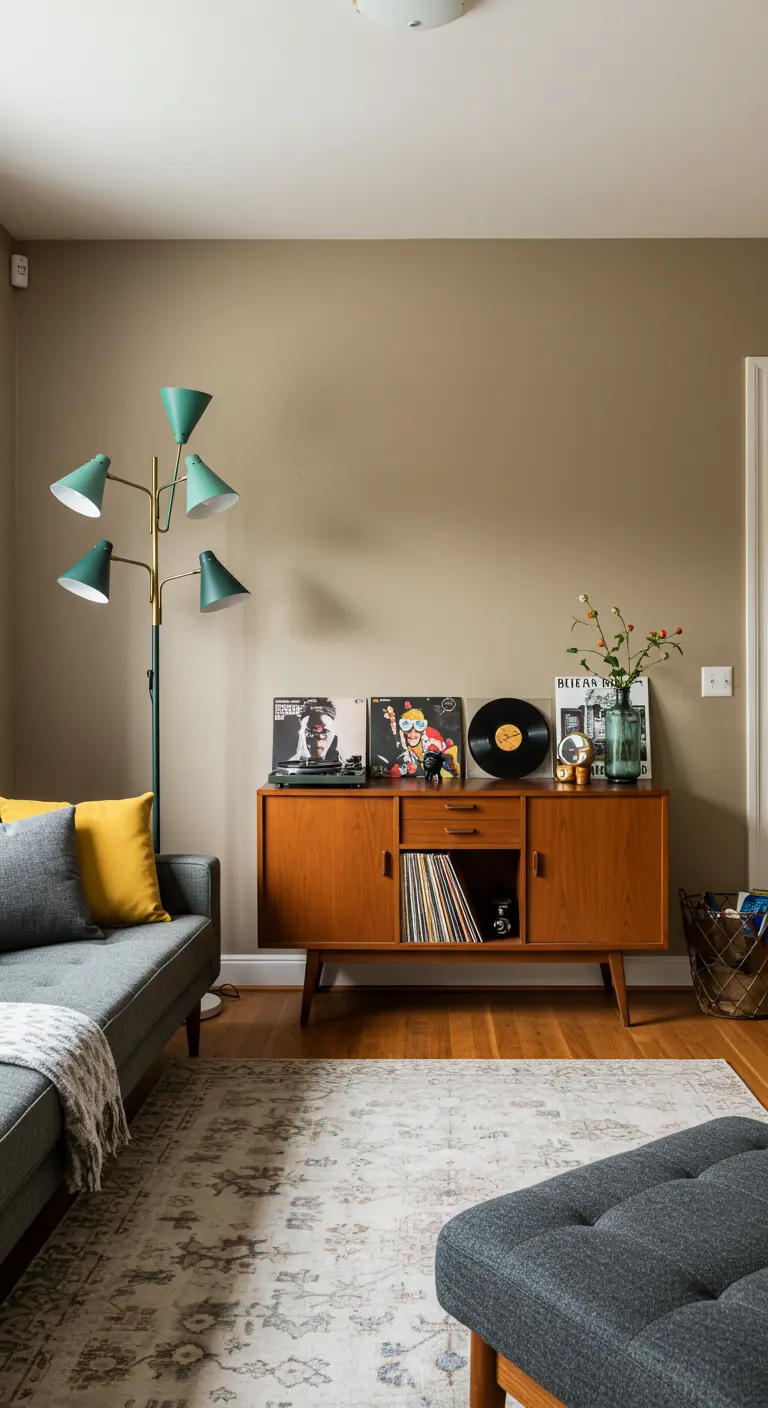
Your passions and collections should be a seamless part of your decor, not hidden away.
Instead of a purely utilitarian storage unit, choose a handsome record console that stands on its own as a beautiful piece of mid-century furniture.
Define the listening area with a distinct floor lamp; its playful color and form designate this corner as a place for enjoyment. This is how you create a home that truly reflects you.
24. Bring Mid-Century Warmth to the Bathroom
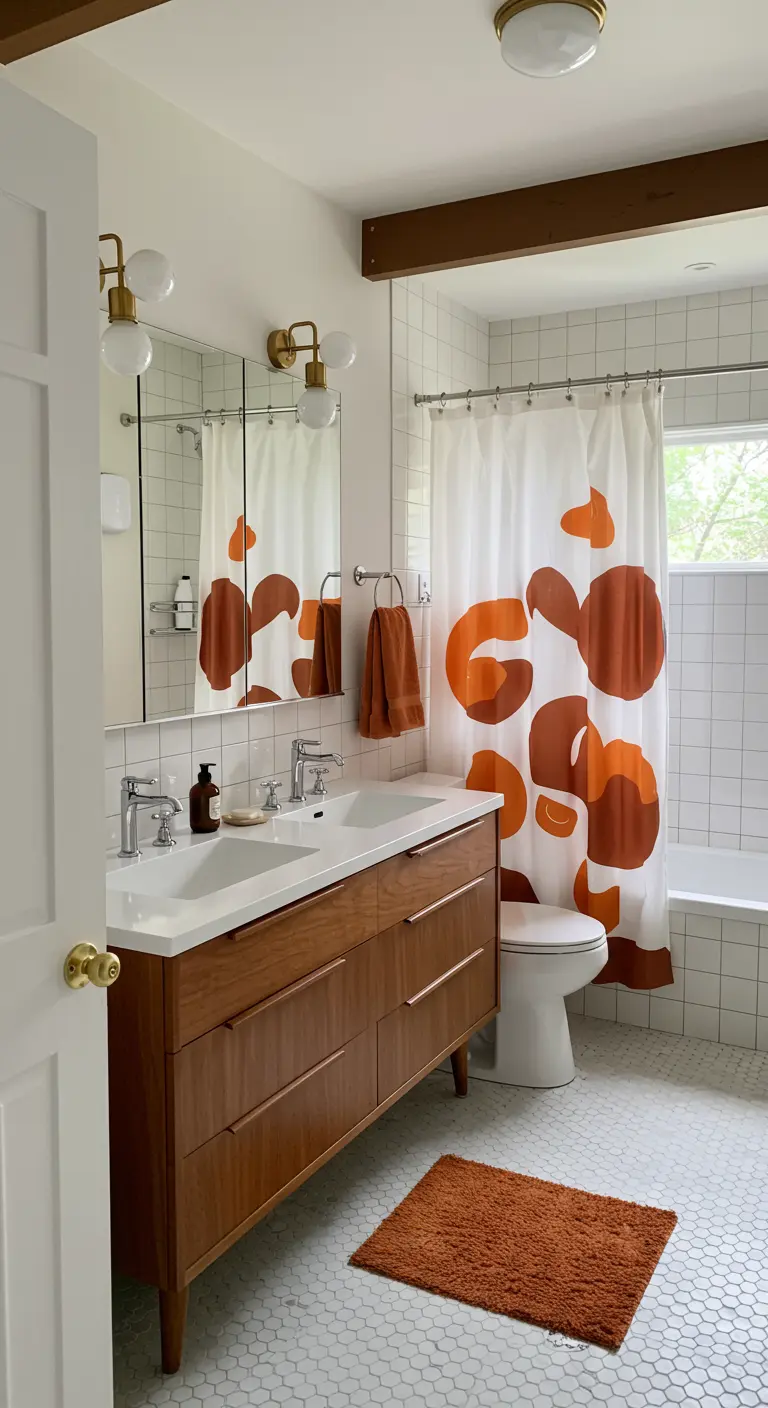
You can achieve a mid-century feel in your bathroom with a few strategic swaps—no major renovation required.
Replace a standard vanity with a freestanding, furniture-style piece in a warm walnut finish with classic tapered legs.
Then, introduce a shower curtain with a bold, retro-inspired graphic print. A simple change like this, paired with a textured bath mat in a coordinating color, can completely transform the character of the room.
The principles are similar to those in these black and brass bathroom designs; it’s all about finish and form.
25. Anchor a Neutral Space with a Bold Rug
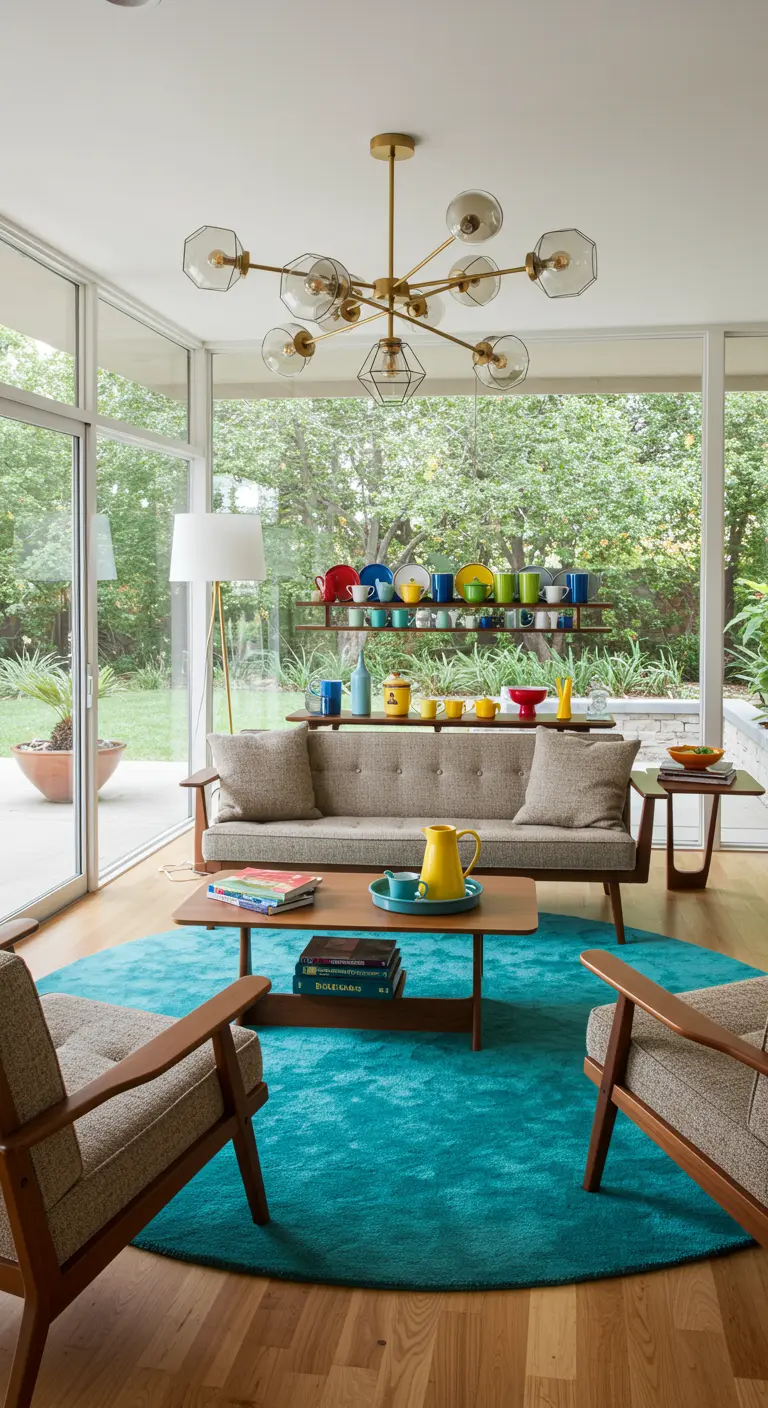
In a room with neutral walls and furniture, a rug is not just a floor covering—it’s the anchor for the entire space.
In this glass-walled room, a large, circular rug in a saturated teal defines the conversation area and provides a powerful dose of color.
It grounds the furniture, preventing it from feeling like it’s floating in the space. This single element provides the foundation upon which the rest of the calm, airy room is built.
